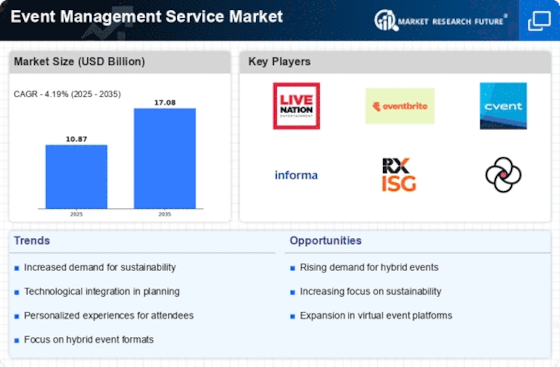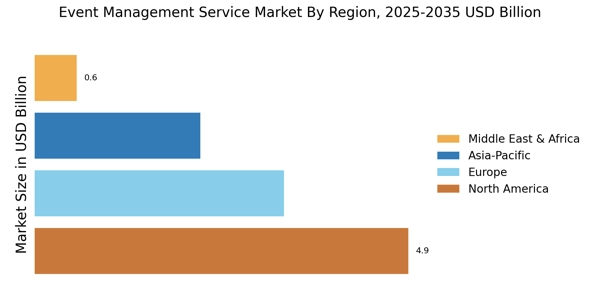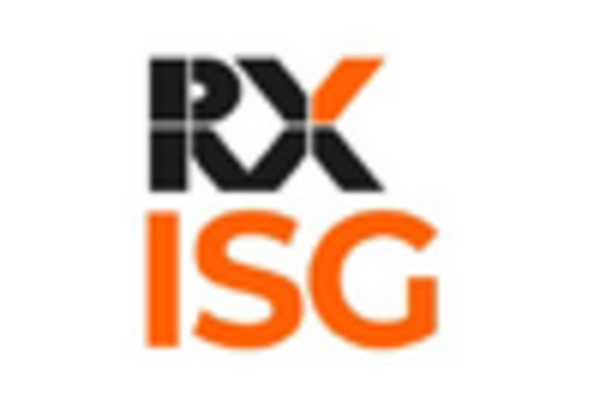Rising Demand for Corporate Events
The event management service Market experiences a notable increase in demand for corporate events, driven by the need for businesses to foster relationships and enhance brand visibility. In recent years, the corporate sector has recognized the value of hosting events such as conferences, product launches, and team-building activities. According to industry data, the corporate events segment is projected to grow at a compound annual growth rate of approximately 8% over the next five years. This growth is attributed to companies seeking to create memorable experiences that resonate with their target audience. As organizations continue to invest in event management services, the industry is likely to witness a surge in innovative event formats and engagement strategies, further solidifying its importance in the corporate landscape.
Growing Popularity of Hybrid Events
The Event Management Service Market is witnessing a shift towards hybrid events, which combine in-person and virtual experiences. This trend is driven by the desire to reach a broader audience while accommodating varying preferences for event attendance. Hybrid events allow organizers to leverage the benefits of both formats, providing flexibility and accessibility to participants. Recent surveys indicate that nearly 70% of event planners are incorporating hybrid elements into their events, reflecting a significant change in how events are conceptualized. This approach not only enhances audience engagement but also expands the potential for sponsorship and revenue generation. As the demand for hybrid events continues to rise, event management services will need to adapt their strategies to effectively cater to this evolving landscape.
Increased Focus on Experiential Marketing
The Event Management Service Market is significantly influenced by the rising trend of experiential marketing, which emphasizes creating immersive experiences for consumers. Brands are increasingly recognizing that traditional advertising methods may not suffice in capturing audience attention. Instead, they are turning to events as a means to engage customers on a deeper level. This shift is evident in the growing allocation of marketing budgets towards live events and experiences. Recent statistics indicate that experiential marketing can yield a return on investment that is up to five times higher than traditional marketing channels. As brands strive to differentiate themselves in a crowded marketplace, the demand for specialized event management services is expected to rise, leading to innovative and memorable consumer interactions.
Emphasis on Sustainability in Event Planning
The Event Management Service Market is increasingly influenced by the emphasis on sustainability and eco-friendly practices in event planning. As awareness of environmental issues grows, both organizers and attendees are prioritizing sustainable options. This shift is prompting event management services to adopt greener practices, such as reducing waste, sourcing local materials, and implementing carbon offset programs. Recent studies suggest that over 60% of event attendees prefer to participate in sustainable events, indicating a clear market demand. Consequently, event management companies are likely to enhance their offerings by integrating sustainability into their planning processes. This focus on eco-consciousness not only aligns with consumer preferences but also positions event management services as responsible and forward-thinking in a competitive market.
Technological Advancements in Event Management
The Event Management Service Market is undergoing a transformation due to rapid technological advancements. Innovations such as event management software, mobile applications, and virtual reality are reshaping how events are planned and executed. These technologies streamline processes, enhance attendee engagement, and provide valuable data analytics for event organizers. For instance, the integration of mobile apps allows for real-time updates and personalized experiences for attendees, which can significantly improve satisfaction rates. Furthermore, the use of data analytics enables organizers to measure event success and optimize future events. As technology continues to evolve, the event management services sector is likely to adapt, leading to more efficient and engaging events that cater to the needs of diverse audiences.

















